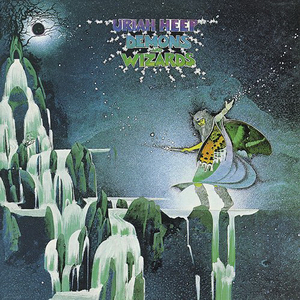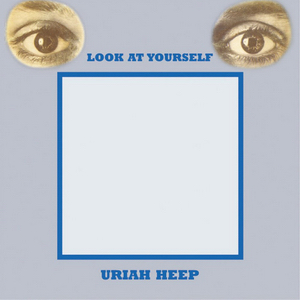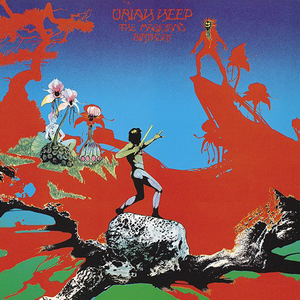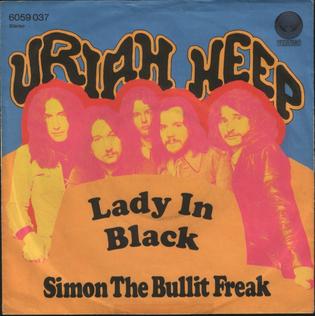
Uriah Heep are an English rock band formed in London in 1969. Their current lineup consists of guitarist Mick Box, keyboardist Phil Lanzon, lead vocalist Bernie Shaw, drummer Russell Gilbrook, and bassist Dave Rimmer. They have experienced numerous lineup changes throughout their 55-year career, leaving Box as the only remaining original member. Notable former members of the band are vocalists David Byron, John Lawton, John Sloman, and Peter Goalby; bassists Gary Thain, Trevor Bolder, John Wetton, Bob Daisley, Paul Newton, and John Jowitt; drummers Nigel Olsson, Iain Clark, Lee Kerslake, and Chris Slade; and keyboardists Ken Hensley, Gregg Dechert, and John Sinclair.

Kenneth William David Hensley was an English musician, singer, songwriter and producer, best known for his work with Uriah Heep during the 1970s.

Salisbury is the second studio album by English rock band Uriah Heep, released in January 1971 by Vertigo Records in the UK and Mercury Records in the US. It was produced by Gerry Bron.

Demons and Wizards is the fourth studio album by English rock band Uriah Heep, released in May 1972 by Bronze Records in the UK and Mercury Records in the US.

Look at Yourself is the third studio album by English rock band Uriah Heep, released in September 1971 by Bronze Records in the UK and Mercury Records in the US. It was the last Uriah Heep album to feature founding member and bassist Paul Newton.

The Magician's Birthday is the fifth studio album by English rock band Uriah Heep, released in November 1972 by Bronze Records in the UK and Mercury Records in the US. The concept was "based loosely on a short story" written by keyboardist Ken Hensley in June and July 1972.

Sweet Freedom is the sixth studio album by English rock band Uriah Heep, released in September 1973 by Bronze Records in the UK and Warner Bros. Records in the US.

Wonderworld is the seventh studio album by English rock band Uriah Heep, released in 1974 by Bronze Records in the UK and Warner Bros. Records in the US. Wonderworld was the last Uriah Heep album to feature bass player Gary Thain.

Return to Fantasy is the eighth studio album by English rock band Uriah Heep, released on 13 June 1975 by Bronze Records in the UK and Warner Bros. Records in the US. It was the first of the two albums to feature John Wetton as the new bass player, who replaced Gary Thain in early 1975.

High and Mighty is the ninth studio album by English rock band Uriah Heep, released in May 1976 by Bronze Records in the UK and Warner Bros. Records in the US. High and Mighty was the last Uriah Heep album to feature bassist John Wetton, and vocalist and founding member David Byron who was fired later that year due to his troubles with alcohol and differences with band priorities.

"The Wizard" is a song by British rock band Uriah Heep, from their 1972 album Demons and Wizards. It was the first single to be lifted from the album. It was composed by Mark Clarke and Ken Hensley. It is a gentle, semi-acoustic ballad whose lyrics deal with a wanderer meeting "the Wizard of a thousand kings". This song is the first Uriah Heep single which had a music video.

"Lady in Black" is a song by the rock band Uriah Heep. It is the fourth track of their 1971 album Salisbury.

"July Morning" is a song by the English rock band Uriah Heep. It is the third track on their 1971 album Look at Yourself.

The Lansdowne Tapes is a compilation album by the British rock band Uriah Heep and released in 1993. The recordings featured on the album date from the time before the change of name to Uriah Heep and during the early sessions that culminated in material eventually used on the bands debut album.

"Gypsy" is the debut single by British progressive rock/hard rock band Uriah Heep. It is the opening track on their first album, …Very 'Eavy …Very 'Umble, released in 1970. "Gypsy" was written by Mick Box and David Byron. The album version of "Gypsy" lasts more than six and half minutes, while the single version lasts less than three minutes. The song was also included on the band's first compilation album, The Best of Uriah Heep, and on two live albums, 1973's Uriah Heep Live and the later Live in Armenia. The song is structured with an intro, outro and three verses with no chorus.

"Spider Woman" is a song by the British rock band Uriah Heep, released on their fifth studio album The Magician's Birthday in 1972. The song was written by David Byron, Mick Box, Gary Thain and Lee Kerslake. "Spider Woman" was released as the lead single from the album in Europe, reaching number 14 in the German charts for twelve weeks. The B-side of the single is "Sunrise", except for Japan, where it was the A-side. The song was recorded in Lansdowne Studios, London, in September 1972.

"Something or Nothing" is a song by British rock band Uriah Heep. The song was written by Ken Hensley, Mick Box and Gary Thain and sung by David Byron. The song is the sixth track on their seventh album Wonderworld, it is also the first track on the second side of the album. "Something or Nothing" was recorded at Musicland Studios in Munich, Germany during January and March 1974. The B-side of the song is "What Can I Do" which has never been released on the album "Wonderworld". The song is being played with only four chords: D,A,C and G. The song has been performed during Uriah Heep live concerts, and was included on their second live album Live at Shepperton '74 as the fourth track.

"Return to Fantasy" is a song by British rock band Uriah Heep from their eighth studio album Return to Fantasy (1975). The song was written by David Byron and Ken Hensley and was the last single by the group to feature David Byron on lead vocals. The song was recorded in May 1975 in London in the Lansdowne and Morgan studios.

"One Way or Another" is a song by English rock band Uriah Heep. It was released on their ninth studio album High and Mighty in May 1976, and became the only single from the album and the last single with the band's former vocalist, David Byron. The song was written by Ken Hensley and featured lead vocals from John Wetton and Ken Hensley. It was recorded from December 1975 to March 1976 in Roundhouse Recording Studios in London. The single did not chart, and it is the only song on the album that was not sung by David Byron.
Sunrise is a song by the British rock band Uriah Heep, originally released on their fifth studio album, The Magician's Birthday, in 1972. The song was written by Ken Hensley and sung by David Byron. The song is considered one of the band's classics, and it also became famous for its live performances in late 1972 and 1973. It was included, as the opening track, on the band's first ever live album, Uriah Heep Live, in 1973. The song was recorded and mixed at Lansdowne Studios, London, in September 1972, and released on The Magician's Birthday in November of the same year. The song is also the B-side of the single "Spider Woman".



















